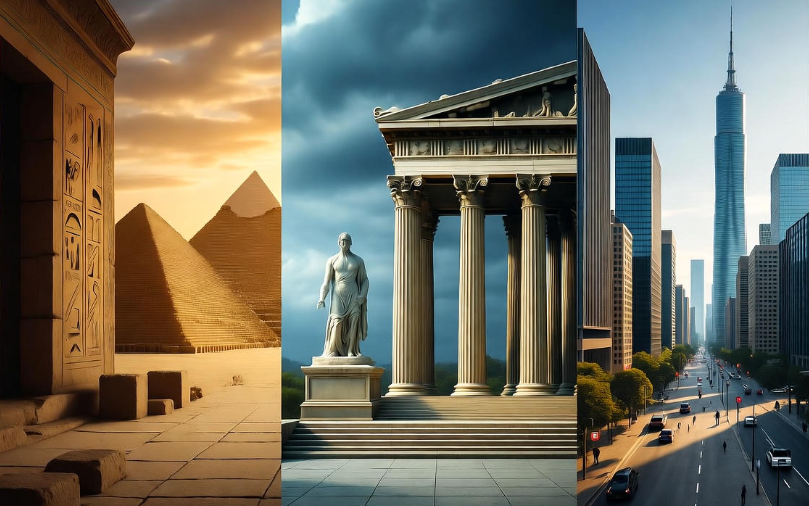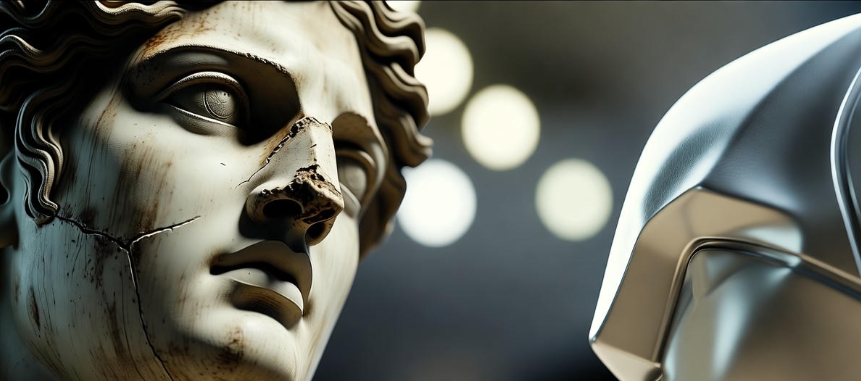Have you ever wondered 🤔 how much of our “modern” world actually comes from the distant past? It’s easy to think we’ve built everything from scratch — our laws, technology, architecture, and even daily habits. But the truth is, modern civilization stands on the shoulders of ancient societies. Their discoveries, values, and inventions still shape the world we live in today.
Let’s take a fascinating journey back in time to explore how ancient societies quietly laid the foundation for modern life — from government systems to medicine, art, and even our calendar. 🌍✨
The Ancient World: The Birthplace of Modern Thinking
Ancient civilizations were not primitive — far from it. They were brilliant thinkers, skilled builders, and deep philosophers. Whether it was Mesopotamia’s writing system, Egypt’s architecture, Greece’s democracy, or China’s inventions, these societies built frameworks that humanity still uses.
Here’s a quick comparison 👇
| Ancient Civilization | Major Contribution | Modern Influence |
|---|---|---|
| Mesopotamia | Writing (Cuneiform), Law (Code of Hammurabi) | Legal systems, record keeping |
| Egypt | Engineering, Architecture, Calendar | Construction, timekeeping |
| Greece | Democracy, Philosophy, Science | Modern politics, education |
| Rome | Law, Roads, Infrastructure | Legal codes, public works |
| China | Paper, Compass, Gunpowder | Navigation, communication |
| India | Mathematics, Medicine, Spirituality | Numerals, Yoga, Ayurveda |
Each of these societies had its unique spark, yet together they built a shared human legacy that still guides our civilization.
The Birth of Writing and Record Keeping 📝
Let’s start with something we often take for granted — writing.
Long before smartphones and emails, the Sumerians of Mesopotamia invented cuneiform — the first known system of writing, around 3400 BCE. They used it to record trade, laws, and stories.
This single invention completely changed human history. Why? Because writing allowed information to be stored, shared, and improved across generations. Without writing, there would be no books, no contracts, no history — nothing to connect one age to another.
Today, our digital documents, texts, and even this article are just the modern versions of that ancient spark.
Law and Order: From Hammurabi to Modern Courts ⚖️
Justice is another powerful legacy from ancient times.
The Code of Hammurabi, created around 1750 BCE in Babylon, was one of the world’s earliest written legal codes. It included rules about fairness, trade, and punishment — “an eye for an eye” might sound familiar.
Modern legal systems still follow the same idea: written laws that apply to all citizens. The Roman Empire later refined this with Roman Law, introducing ideas like “innocent until proven guilty.” Sound familiar? That’s straight from ancient Rome to modern courtrooms.
Government and Democracy 🗳️
When we talk about democracy, most people think of modern countries — but democracy was actually born in ancient Greece, especially in Athens around the 5th century BCE.
Greek citizens gathered to vote on laws and make decisions collectively — the same core idea that drives democratic governments today. Even modern words like politics, democracy, and citizen come from Greek roots.
Meanwhile, ancient Rome gave us the idea of a Republic, where representatives made decisions on behalf of citizens. That’s the foundation of most governments today — from the U.S. to India and beyond.
Science and Philosophy: Seeds of Rational Thought 💭
The ancient world was full of thinkers who asked big questions:
“What is the universe made of?” “Why do things fall?” “What makes something good or bad?”
Greek philosophers like Socrates, Plato, and Aristotle laid the foundation of modern philosophy and science.
They encouraged people to question, to reason, and to seek evidence — ideas that gave birth to modern science centuries later.
Similarly, ancient Indian scholars explored astronomy, mathematics, and logic long before Europe’s “scientific revolution.” The concept of zero (0), for instance, came from ancient India — a symbol that completely changed mathematics and technology.
Architecture and Engineering 🏛️
Ancient builders were true visionaries.
The Egyptians built pyramids that still stand after 4,000 years — perfect examples of geometry and precision.
The Romans, on the other hand, developed arches, aqueducts, and concrete. Many of their bridges and roads are still in use today!
Modern architects and engineers still borrow principles from them. Even skyscrapers and modern cities echo ancient designs — from symmetry to the use of durable materials.
Here’s a quick peek:
| Ancient Structure | Modern Equivalent | Shared Concept |
|---|---|---|
| Roman Aqueducts | Water pipelines | Efficient water transport |
| Egyptian Pyramids | Monuments, Museums | Symbolic architecture |
| Greek Temples | Government buildings | Columns, symmetry |
| Chinese Great Wall | Border structures | Defense and boundaries |
Medicine and Healing 💊
Ancient medicine might sound primitive, but it was surprisingly advanced.
The Egyptians practiced surgery and used herbal medicines.
In India, the Ayurvedic system promoted body balance through diet and nature — still popular worldwide today.
Greek physician Hippocrates, known as the “Father of Medicine,” introduced the idea that illnesses have natural causes — not punishments from gods.
That mindset is the foundation of modern medical science. Even the Hippocratic Oath, taken by doctors today, is named after him.
Mathematics and Astronomy 🔭
From measuring land to understanding stars, ancient societies looked up and calculated.
The Babylonians used early algebra, while the Mayans and Egyptians tracked the movement of planets and stars to build accurate calendars.
Ancient Indians introduced the decimal system and the concept of zero, while the Greeks like Euclid shaped geometry — still taught in schools today.
Without these ancient contributions, there would be no computers, satellites, or GPS systems. 🌌
Art, Culture, and Literature 🎭
Art is one of humanity’s oldest expressions, and ancient societies used it to tell stories, celebrate gods, and preserve culture.
From Greek theater to Egyptian hieroglyphs, Chinese calligraphy, and Indian epics like Mahabharata — all inspired today’s literature, movies, and visual arts.
Modern storytelling owes much to ancient myths and symbols. Even superhero movies borrow from them — think of Thor (Norse mythology) or Wonder Woman (Greek myths).
Religion and Morality 🕊️
Ancient societies also shaped how we understand morality, purpose, and the divine.
Egyptians believed in life after death, Greeks explored divine justice, and Eastern traditions like Buddhism and Hinduism introduced karma and compassion.
These ideas still influence how people view ethics, spirituality, and community today — regardless of religion.
Trade, Economy, and Currency 💰
Ancient markets were the beginning of global trade.
The Phoenicians sailed across the Mediterranean, the Chinese Silk Road connected Asia to Europe, and Lydians were the first to mint coins.
This idea of exchange led to today’s global economy — banks, money, and international trade routes all began in those early networks.
Education and Knowledge Transfer 📚
Ancient Greek academies, Roman schools, Indian Gurukuls, and Chinese Confucian institutions were the early universities of the world.
They trained thinkers, leaders, and innovators — just as schools and colleges do today.
Even the concept of “curriculum” and “library” came from these civilizations.

Ancient Wisdom in Modern Life 🌱
If you look closely, traces of ancient societies are everywhere — not just in buildings or systems but in our habits and ideas.
| Modern Concept | Ancient Origin | Example |
|---|---|---|
| Timekeeping | Egyptian solar calendar | 24-hour day |
| Gym and Fitness | Ancient Greece | Olympic Games |
| Maps | Babylonian clay maps | GPS navigation |
| Roads and Traffic | Roman infrastructure | Modern highways |
| Architecture | Greece and Rome | Government buildings |
We may have new technology, but the blueprint of civilization remains ancient.
Why Ancient Societies Still Matter Today ❤️
Understanding ancient societies isn’t just about history — it’s about knowing where we come from. Their mistakes teach us caution, and their wisdom guides progress.
When we study them, we realize how connected humanity really is. Every invention, idea, and law was a step in one long journey — from clay tablets to smartphones.
The more we understand their stories, the better we can shape our future 🌎.
FAQs
Q1: Which ancient civilization influenced modern life the most?
It’s hard to pick one — Greece influenced politics and philosophy, Rome shaped law and architecture, and China changed technology and trade. Each left a unique legacy.
Q2: How did ancient societies communicate without modern tools?
They used symbols, carvings, letters, and messengers. The invention of writing and paper in Mesopotamia and China made communication easier over time.
Q3: What modern inventions came from ancient times?
Many! Paper, concrete, democracy, calendars, irrigation, and even basic mathematics all began in ancient societies.
Q4: Why should we still study ancient civilizations?
Because they help us understand human progress, cultural identity, and how knowledge evolved. It’s like reading the first chapters of humanity’s story.
Q5: How can ancient values help us today?
Values like justice, wisdom, balance, and respect for nature are timeless. They remind us how to build a fair and sustainable future.
Final Thought 💬
Modern life might look high-tech and advanced, but it’s deeply rooted in the wisdom of ancient times.
Every bridge we cross, every law we follow, every story we tell — all carry whispers of ancient brilliance.
So next time you glance at a tall building, write a message, or look at the stars 🌠, remember — you’re living in a world built by the hands and minds of those who came thousands of years before us.

Leave a Reply